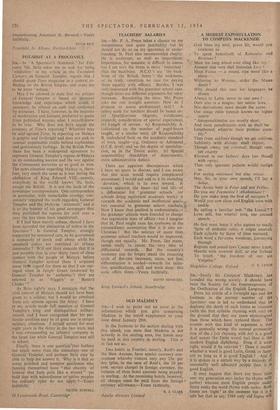TEACHERS' SALARIES
SIR,—Mr. P. A. Preen takes a chance on my inexperience (not quite justifiably) but he should not do so on my ignorance or under- standing: St. Paul also recommended charity. He is irrelevant, as well as impertinent. Importance, for instance, is difficult to assess, but I am sure the brain is more ' important ' than the backbone. N.C.O.'s are ' the back- bone of the British Army ': the nickname, or its truth, constitute no case for paying them equally with officers. Besides, I was only concerned with the grammar school case, though there are different arguments for other increases. Broadening the issue, Mr. Preen asks me one straight question: How do I propose to assess professional skill ? A salary scale for teachers should be based on: (a) Qualifications (degrees, certificates, research; consideration of special experience).
(b) Length of service. (c) Responsibility A. (calculated on the number of pupil-hours taught, or a similar unit). (d) Responsibility B. (calculated both on the academic standard of work taught—e.g. Ordinary or Advanced G.C.E. level; and on the degree of specialisa- tion, as in the Teviot scale). (e) Special responsibility (headships of departments; extra administrative duties).
There are apparent discrepancies which I have no space to discuss, and I am aware that this scale would require complicated assessment: I would not add to it by including 'devotion,' which is its own reward. It makes apparent the bases—(a) and (d)--of a differential for grammar schools' (or schools doing equivalent academic work): it rewards the academic and intellectual quali.„. ties essential to grammar school teachers. Now I know that intellect is undemocratic,— the grammar schools were founded to change that regrettable state of affairs—but I imagine that St. Paul might raise his eyebrows at the extraordinary assumption that it is also un- Christian ! But the salaries of more than grammar school teachers would be improved, though not equally. Mr. Preen, like many, seems really to resent the very idea of differential rewards. But the country's economy can no longer stand the recurring cycle of flat-rate increases; more, not less, differentiation is needed—rewards for initia- tive, qualifications, skill and work done: this scale offers them.—Yours faithfully,
DAVID HENSCHEL


































 Previous page
Previous page